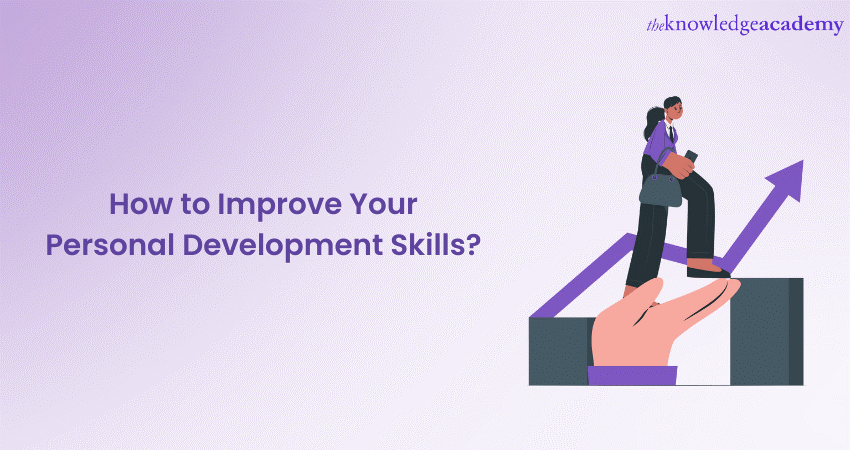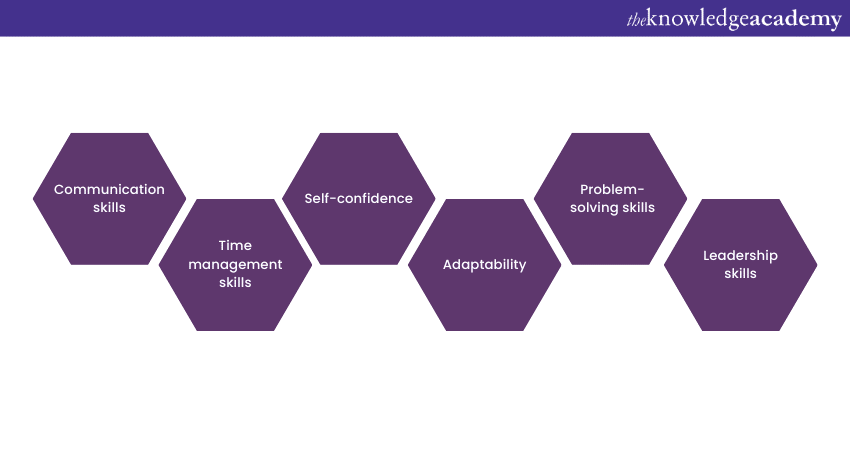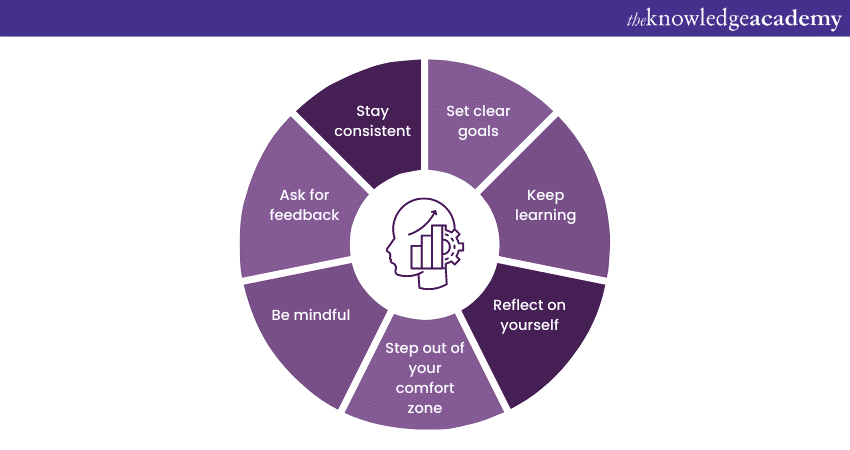We may not have the course you’re looking for. If you enquire or give us a call on +44 1344 203 999 and speak to our training experts, we may still be able to help with your training requirements.
Training Outcomes Within Your Budget!
We ensure quality, budget-alignment, and timely delivery by our expert instructors.

In the hustle and bustle of modern life, focusing on Personal Development might seem like a luxury. However, it's necessary to learn How to Improve Your Personal Development Skills to unlock your full potential and lead a fulfilling life.
From a student, a professional, an artist, or anyone with a passion to learn and grow, learning How to Improve Your Personal Development Skills can be a boon. It can help bring balance to your life.
Want to know how can learning these can prove beneficial? Read this blog to learn How to Improve your Personal Development Skills effectively. Explore easy tips and techniques through this blog.
Table of Contents
1) Understanding Personal Development Skills
2) Types of Personal Development Skills
3) Strategies to improve Personal Development Skills
a) Set clear goals
b) Defeat your fears
c) Develop a reading habit
d) Learn a new skill or ability
e) Observe and learn from others
f) Start small
g) Stay consistent
h) Reflect on yourself
i) Ask for feedback
4) Conclusion
Understanding Personal Development Skills
Personal Development Skills are a valuable asset to an individual’s personal growth. Developing these Skills help them deal with the different phases of their life, make good relationships, and move towards their goals. They're not just about what you do alone – they affect how an individual feels, what they achieve, and how satisfied they are.
These Skills are all connected, working together to help you become better. When an individual improves one skill, it often improves other parts of their life, too. For example, if you get better at talking and listening, it doesn't just help you talk to others – it also makes it easier to understand them.
It is important to note that Personal Development Skills aren't fixed and unchangeable – they can be enhanced and get better over time. Working on Personality Development is a journey that needs patience and a willingness to try new things.

Types of Personal Development Skills
After learning about what Personal Development Skills are, it’s time to understand how to improve these Skills. So, let’s explore the different types of Personal Development Skills that make you more capable and confident:

Time Management skills
Time Management skills help you use your time wisely and efficiently. When you have good Time Management skills, you can do tasks in a smarter and faster way, which means you can accomplish more without feeling rushed or stressed.
You also feel more in control and less overwhelmed when you are organised and know what to do next. These skills help you focus on what is important and keep your priorities in check.
Communication skills
Communication Skills are essential for Personal Development. They help us connect to others in our personal and professional lives. Good communication is more than talking; it is listening and expressing ourselves clearly.
By communicating well, we build strong relationships. We show respect and care by listening attentively. We also create trust and understanding. Moreover, we avoid confusion by explaining our thoughts well. Think of telling a friend how to play a game – clarity is important, right? Listening and speaking will help us succeed in both our careers and relationships.
Emotional intelligence
Emotional Intelligence involves acknowledging, managing, and understanding your own emotions as well as other people's emotions. Emotional Quotient (EQ) begins with self-awareness, which is the foundation for other aspects of EQ. By being aware of your emotions, you can make better choices and control your reactions to different situations. You can also empathise with others and communicate effectively.
Critical thinking
Critical thinking is the ability that helps you develop independent and creative thinking. Critical thinking enables you to engage with research and publications more critically by reading reliable sources and asking questions about their strengths and weaknesses.
Moreover, this can help you research effectively and avoid misinformation. It can also help you find new ways to innovate in your own work by challenging assumptions and generating alternatives.
Adaptability
Adaptability involves adjusting, evolving and responding to new and unpredictable situations. Adaptability is not only beneficial but essential for personal growth, professional success, and well-being in today’s dynamic world.
Adaptability requires flexibility, which means being open and receptive to change. Flexible people are willing to step out of their comfort zones and try new things. This leads to more creative solutions and opportunities.
Self-confidence
Self-confidence empowers you to face challenges, overcome obstacles, and pursue your goals despite setbacks. Self-confidence involves cultivating self-awareness and positive self-talk.
Self-awareness, in turn, helps you find your strengths and weaknesses, while positive self-talk helps you boost your self-esteem and motivation. Self-confidence is not about arrogance or ignoring your limitations. It is about acknowledging your potential and learning from your mistakes.
Problem-solving skills
Problem-solving is a vital skill to learn while Improving Your Personal Development Skills. It involves the process of finding issues, analysing their root causes, and devising strategies to solve them. This skill requires a combination of analytical thinking, creativity, resourcefulness, and persistence to discover and implement solutions.
Problem-solving Skills are highly adaptable to different situations. In the workplace, individuals who are good at problem-solving can spot inefficiencies, enhance processes, and foster innovation. In personal relationships, these skills facilitate effective communication and conflict resolution, resulting in stronger bonds and mutual understanding.
Leadership skills
Leadership Skills are a set of qualities and abilities that go beyond formal titles and positions. They enable individuals to influence others positively, promote teamwork, and advance initiatives. While being in a formal leadership role involves these skills, they are not restricted to such positions.
Effective communication is the core of leadership skills. Leaders must be able to communicate their ideas, visions, and expectations clearly. Developing leadership skills equips individuals with the tools to inspire, guide, and empower others, regardless of their role within an organisation or group.
Strategies to improve Personal Development Skills
Our world today is extremely competitive and in order to succeed you have to constantly improve yourself. So, the Importance of Personal Development cannot be understated. Thus, the question remains: How to Improve Your Personal Development Skills? It's time to explore the various strategies that can be useful to Improve Your Personal Development SkillsLet’s have a detailed look at each one of them:

1) Set clear goals
The journey to Personal Development begins with setting clear, measurable, and achievable goals. For instance, to improve sleep hygiene, setting a target for weekly sleep hours is a practical approach. Setting timelines boosts motivation but ensures they are realistic. Be open to modifying goals for more practicality, and remember that gradual change is key.
2) Defeat your fears
Growth and progress are often hindered by fear, particularly the fear of failure. Confronting this fear by actively engaging in challenging activities, such as public speaking courses for those who dread public speaking, is vital.
For those who fear taking risks, mentorship for better decision-making and confidence-building is beneficial. Whether it's personal or professional, growth lies in stepping out of your comfort zone. In a fast-paced world, overcoming shyness by engaging in new communities is crucial.
3) Develop a reading habit
Developing a reading habit is a cornerstone of Personal Development. Reading not only broadens knowledge and wisdom but also provides new perspectives and enhances understanding of different priorities and viewpoints. It stimulates the mind with innovative ideas and sharpens critical thinking. Setting a goal to read an educational or inspirational piece daily or a book monthly is an excellent start.
4) Learn a new skill or ability
Expanding your skillset through learning new abilities is greatly advantageous. It makes you more versatile and equips you with tools to tackle new challenges. This can involve taking courses related to your job, like programming or Creative Writing, or unrelated skills like first-aid or entrepreneurship. These skills enhance your professional profile and can be beneficial in various life situations.
5) Observe and learn from others
Improvement can also come from observing and emulating the qualities of a mentor or an inspiring colleague. Engaging with a mentor, be it a manager, professor, or any other professional, for personal growth can provide insights into developing self-improvement skills. They can offer guidance in identifying and cultivating these skills.
6) Start small
Approaching Personal Development with small, manageable steps can make daunting goals more attainable. For example, breaking down the goal of becoming a better communicator into smaller tasks can make it less overwhelming. Achieving small goals boosts confidence and morale, setting a positive path toward your larger objectives.
7) Stay consistent
The key to Personal Development is consistency. Regular practice and sustained effort are essential for gradual improvement and long-term growth. Staying committed to practising and refining your skills fosters discipline, leading to transformative changes over time.
8) Reflect on yourself
Regular self-reflection is crucial in Personal Development. Weekly self-assessments can help you stay aware of your progress and areas needing improvement. This practice can keep you from becoming complacent and support continuous self-evaluation. Be open to adjusting your Personal Development plan as needed to ensure it remains effective.
9) Ask for feedback
Feedback from others can provide valuable insights, especially when you're too close to a situation to see it objectively. Don’t hesitate to seek feedback on your development progress from peers, loved ones, or professionals.
Whether it’s improving communication skills or health-related goals, getting external perspectives can be incredibly helpful. Consider consulting a Personal Trainer, Therapist, or a knowledgeable friend for their observations.
Conclusion
Learning How to Improve Your Personal Development Skills leads to a more fulfilling and successful life. By understanding the various types of Personal Development Skills, you can develop your abilities and create positive changes in all aspects of your life. So, enjoy this journey, and watch as you grow into the best version of yourself.
Unlock your full potential with our Personal Development Training - enjoy the journey of growth and self-improvement.
Frequently Asked Questions

Enhancing Personal Development Skills can significantly boost your career by improving your efficiency, adaptability, and interpersonal relations. These skills lead to better problem-solving, decision-making, and collaboration, making you a more valuable and promotable employee.

Yes, Personal Development Skills can greatly improve work-life balance. Skills like time management, stress management, and setting boundaries help in efficiently organising work tasks, reducing burnout, and ensuring ample time for personal life, leading to overall well-being and job satisfaction.

The Knowledge Academy takes global learning to new heights, offering over 30,000 online courses across 490+ locations in 220 countries. This expansive reach ensures accessibility and convenience for learners worldwide.
Alongside our diverse Online Course Catalogue, encompassing 17 major categories, we go the extra mile by providing a plethora of free educational Online Resources like News updates, Blogs, videos, webinars, and interview questions. By tailoring learning experiences further, professionals can maximise value with customisable Course Bundles of TKA.

The Knowledge Academy’s Knowledge Pass, a prepaid voucher, adds another layer of flexibility, allowing course bookings over a 12-month period. Join us on a journey where education knows no bounds.

The Knowledge Academy offers various Personal Development Courses, including Time Management, Stress Management, and Emotional Intelligence Training. These courses cater to different skill levels, providing comprehensive insights into Effective Communication.
Our Business Skills blogs cover a range of topics related to Personal Development, offering valuable resources, best practices, and industry insights. Whether you are a beginner or looking to advance your Personal Development Skills, The Knowledge Academy's diverse courses and informative blogs have you covered.
Upcoming Business Skills Resources Batches & Dates
Date
 Time Management Training
Time Management Training
Fri 10th Jan 2025
Fri 14th Mar 2025
Fri 9th May 2025
Fri 11th Jul 2025
Fri 12th Sep 2025
Fri 14th Nov 2025







 Top Rated Course
Top Rated Course


 If you wish to make any changes to your course, please
If you wish to make any changes to your course, please


